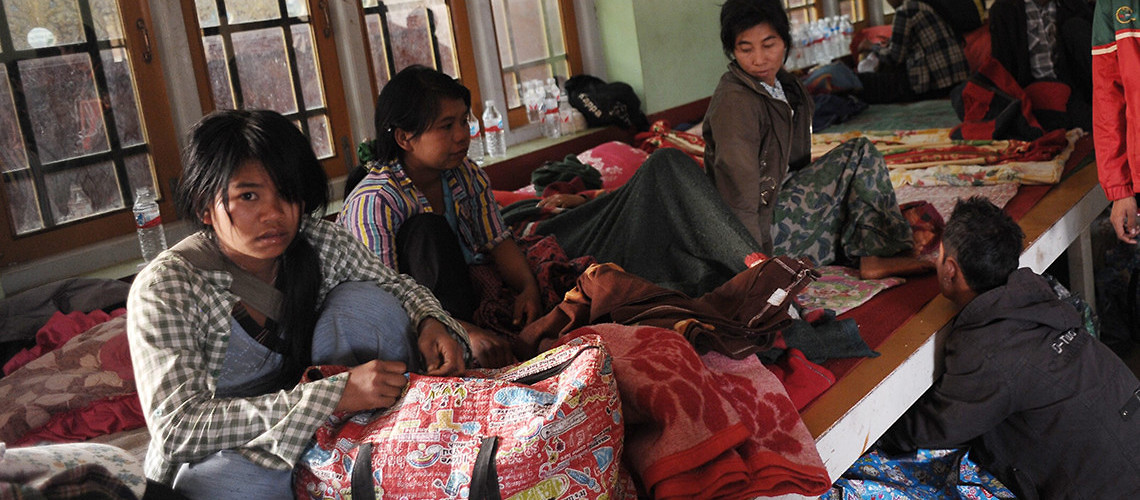Residents who fled conflict between ethnic rebels and the Myanmar government in Shan State gather in a temporary refugee camp. Lashio, Myanmar, February 19, 2015. (Ye Aung Thu/AFP/Getty Images)
The Myanmar government today signed the long-awaited National Ceasefire Agreement (NCA) with eight ethnic armed groups, rather than the originally intended 16 parties to the agreement. Given the exclusion of key players, it is unclear at this stage what peace and security the NCA can deliver. Moreover, as the Women’s League of Burma stated on Tuesday, “the NCA is not only non-inclusive for the ethnic groups, it’s also non-inclusive of women.”
The major criticism from women’s groups is that the government in Naypyidaw has reneged on the commitment negotiated among the non-state armed groups to a 30% quota of women’s participation in future political dialogue. Instead, the NCA contains only a reference to the fact that “an appropriate proportion of women” can take part.
The government has been has been accused of leading a closed negotiation process on the NCA in order to control the outcome in time for the country’s historic parliamentary elections on November 8. On the other hand, some experts argue that expanding the agreement to new parties may have unraveled an already complex agreement. Some minority civil society groups point to the competition between different ethnic groups as a reason for the discord, with organizations accused of using the process to achieve political and financial gain by holding out.
The government has said it will continue to negotiate with the non-signatories in the hope they will join the NCA. Meanwhile, fighting continues in northern Shan State, where armed groups allege that the national armed forces, the Tatmadaw, have launched a punitive offensive. There have also been reports that some in the government suspect China as having a negative influence on Shan armed groups, and that this may explain their decision to not sign the NCA.
Australia, the United Kingdom, Europe, and the United States have remained committed to the creation of a Joint Peace Fund to assist with the implementation of the peace process. This is intended to ensure those who signed the NCA will begin to see the economic investment benefits of their participation, encouraging others to join the process. However, a less optimistic alternative is that it could create further division at a time when the elections are already creating ethnic, religious, and political tension.
What cannot be doubted is that more than half the population in Myanmar has had little formal opportunity to engage in the peace or parliamentary process. Nor to date have women and girls reaped the benefits of the rapid economic investment in Myanmar over the past five years, as judged by poverty, literacy, land ownership, and wage indicators.
Though women are represented in every ethnic, religious, and political faction in the country, they only have 28 seats in a 664-seat parliament and comprise just two members of a 36-member cabinet. Also, only one member of the National Ceasefire Coordination official delegation team is a woman.
In this context, one of the few certain outcomes of the NCA is that women and children will suffer long-term consequences if the peace process fails to attract the signature of all parties and to end the longest-duration civil war anywhere in the world since the end of World War II.
The NCA negotiations have occurred amid a renewed push to increase the empowerment of women and girls across the globe. Goal 5 of the recently adopted United Nations Sustainable Development Goals serves this exact purpose and is key to the achievement of Goal 16: “Promote peace and inclusive societies for sustainable development.”
This week the UN Security Council is also meeting to review progress over the 15 years that its Resolution 1325 on women, peace and security has been in place. The Council has recognized that failing to deliver on achieving women’s participation, protection, and contribution to the prevention of conflict has a major negative impact on the prospects for sustainable peace.
The Global Study commissioned by the UN Secretary-General on the implementation of Resolution 1325 provides powerful evidence of this fact. It draws on research [published by the International Peace Institute] that found the presence of women in peace processes as witnesses, signatories, mediators and/or negotiators makes it 20% more likely that a peace agreement will last at least two years and 35% more likely it will last 15 years.
There is no clearer case than Myanmar for demonstrating why one of the international community’s first goals for the next 15 years has to be including women at the table in the negotiation of all peace agreements. Consequently, donor countries should set a women’s participation target in the management of the Joint Peace Fund, and in conditions attached to its program funding and delivery.
This is true not because women are more peaceful or less bound by ethnic, political, and religious allegiances than men, but simply because they represent at least half of the population and their participation and progress is essential to achieving peace and security. All eyes should be on Myanmar as a major test of global commitments to peace, security, sustainability, and gender equality.
Sara E. Davies is Senior Research Fellow in the Faculty of Law, Queensland University of Technology. Jacqui True is Professor of Politics & International Relations at Monash University.





